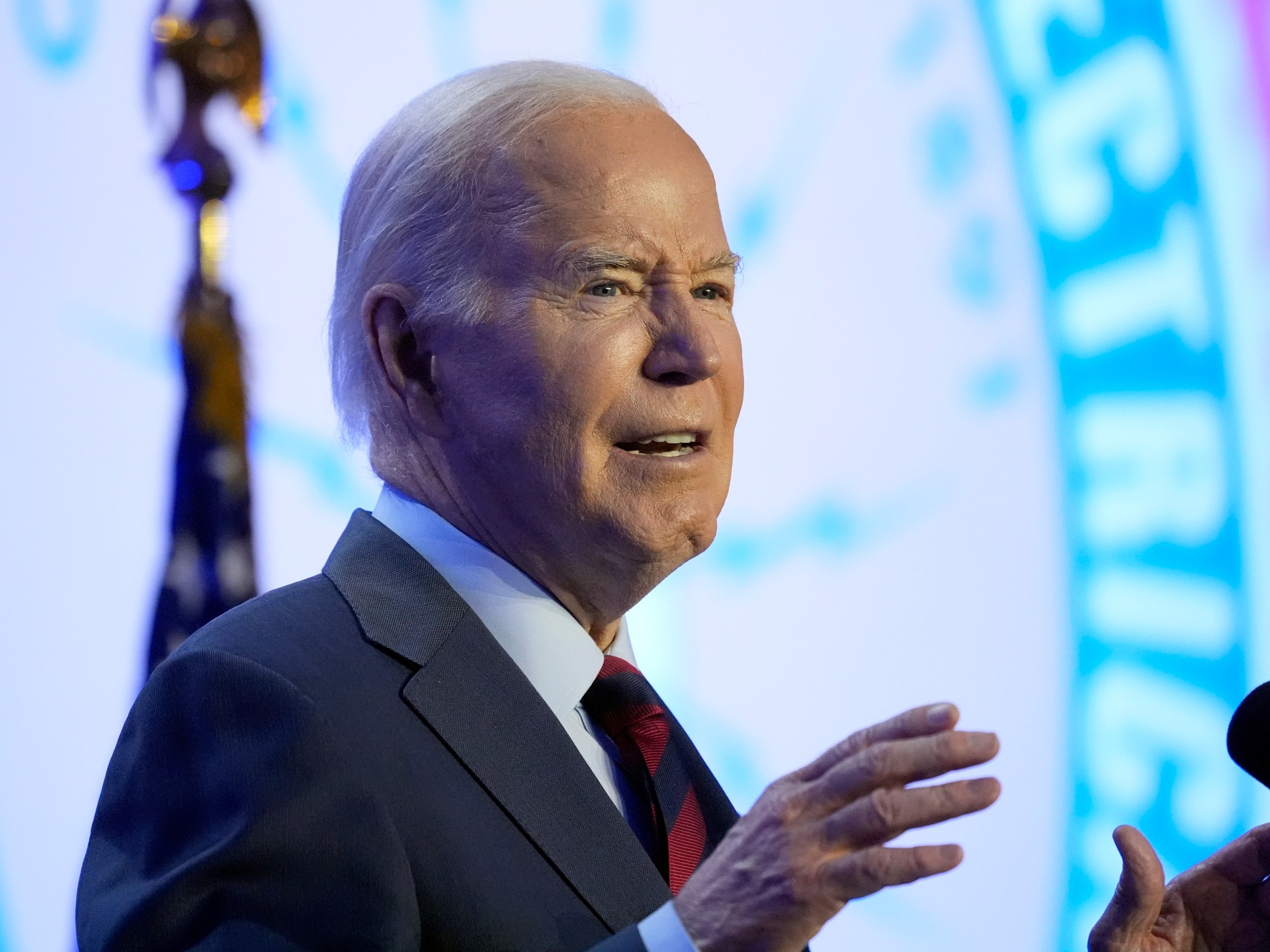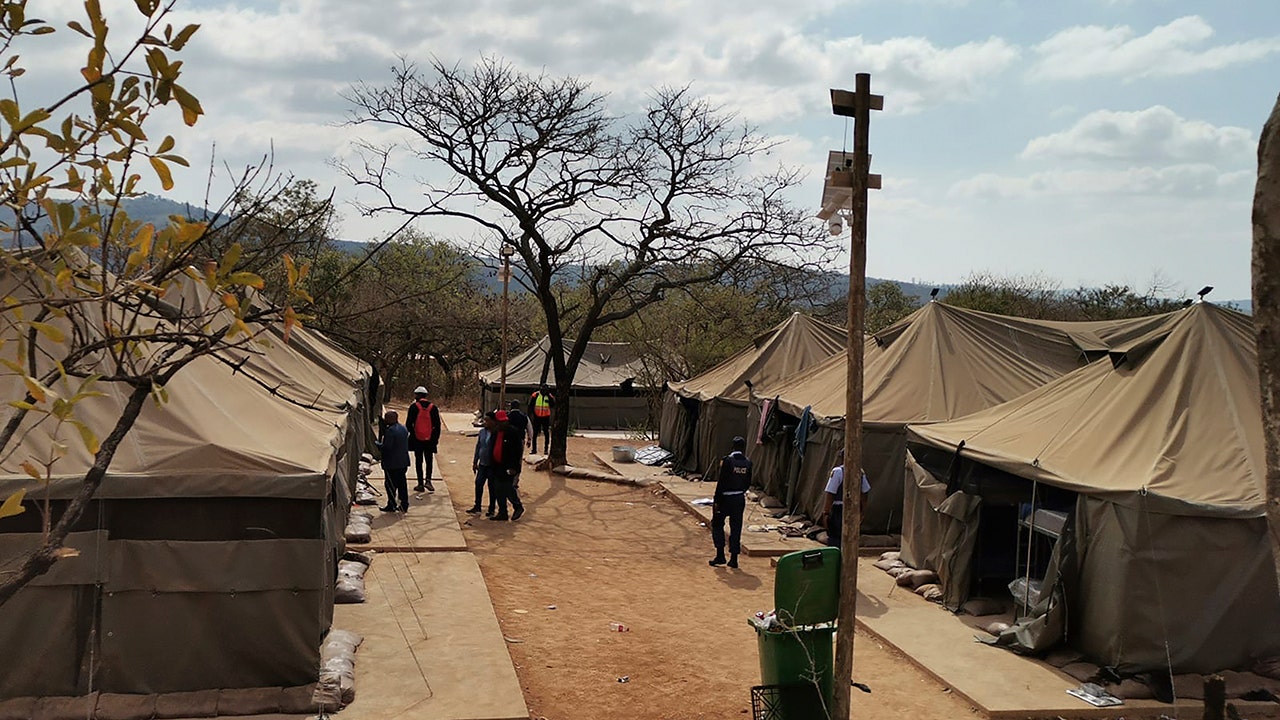World
Biden condemns ‘blatant’ anti-Semitism at Columbia pro-Palestine protests

Biden’s remarks come after footage emerges appearing to show Jewish students being harassed and intimidated.
United States President Joe Biden has condemned pro-Palestinian activists for acts of “blatant” anti-Semitism during protests at Columbia University.
In a statement to commemorate the Jewish holiday of Passover on Sunday, Biden said it was necessary to speak out against “the alarming surge of antisemitism – in our schools, communities, and online”.
“Silence is complicity. Even in recent days, we’ve seen harassment and calls for violence against Jews,” Biden said.
“This blatant antisemitism is reprehensible and dangerous – and it has absolutely no place on college campuses, or anywhere in our country.”
Biden’s comments came after reports emerged over the weekend of harassment and threats against Jewish students on the campus of Columbia University in New York.
Footage shared on social media appeared to show activists telling students to “go back to Poland” and that October 7 is “going to be every day for you” – referring to Hamas’s attacks on Israel in which 1,139 people were killed.
“Never forget the 7th of October. That will happen not one more time, not five more times, not 10…100…1000…10,000…The 7th of October is going to be every day for you.”
Protestors screamed this at two Jewish @Columbia students right outside campus gates tonight. pic.twitter.com/VYp0tFudGj
— Jonas Du (@jonasydu) April 19, 2024
Chabad at Columbia University, a chapter of an international Orthodox Jewish movement, said in a statement that protesters had also told Jewish students, “You have no culture”, “All you do is colonise” and to “Go back to Europe”.
In a statement on Sunday, a group of student activists representing the protesters distanced themselves from “inflammatory individuals” and said they reject “any form of hate or bigotry”.
“We are frustrated by media distractions focusing on inflammatory individuals who do not represent us. At universities across the nation, our movement is united in valuing every human life,” the statement said.
“Our members have been misidentified by a politically-motivated mob. We have been doxxed in the press, arrested by the NYPD [New York Police Department], and locked out of our homes by the university. We have knowingly put ourselves in danger because we can no longer be complicit in Columbia funnelling our tuition dollars and grant funding into companies that profit from death.”
Biden made his remarks hours after a statement by the White House calling out “physical intimidation targeting Jewish students and the Jewish community”.
“While every American has the right to peaceful protect, calls for violence and physical intimidation targeting Jewish students and the Jewish community are blatantly antisemitic, unconscionable, and dangerous – they have absolutely no place on any college campus, or anywhere in the United States of America,” White House Deputy Press Secretary Andrew Bates said.
“And echoing the rhetoric of terrorist organisations, especially in the wake of the worst massacre committed against the Jewish people since the Holocaust, is despicable.”
New York City Mayor Eric Adams and New York State Governor Kathy Hochul have also condemned reports of harassment and intimidation at the protests.
Columbia, one of the most prestigious universities in the US, has emerged as a hotbed of student activism since the start of Israel’s war in Gaza following the October 7 attacks.
On Thursday, the New York Police Department arrested more than 100 pro-Palestinian protesters after its officers swarmed the campus and cleared an encampment set up by students.
Some students involved in the protests said they had been suspended from Columbia and its associate institution, Barnard College, including Isra Hirsi, the daughter of Democratic Congresswoman Ilhan Omar.

World
Celine Dion Makes Triumphant Comeback at Paris Olympics Opening Ceremony — Watch Full Performance

ad
World
95 Libyan nationals arrested in South Africa at suspected secret military training camp

South African police arrested 95 Libyan nationals in a raid on a suspected secret military training camp on Friday and authorities said they were investigating whether there were more illegal bases in other parts of the country.
The camp was discovered at a farm in White River in the Mpumalanga province, about 360 kilometers (220 miles) northeast of Johannesburg, police said.
ELEPHANTS KILL TOURIST IN SOUTH AFRICA AFTER HE TRIED TO GET CLOSE TO TAKE PICTURES
National police spokesperson Athlenda Mathe said in a post on the social media site X that the Libyans stated they had entered the country on study visas to train as security guards, but police investigations suggest they have received military training.
The Newzroom Afrika TV news channel broadcast pictures of the site of the arrests, showing a military-style camp with large green and khaki tents set up in a row. Dozens of men were seen lining up as they were arrested. They were wearing civilian clothing.
Local government official Jackie Macie said investigations were ongoing and the owner of the farm would be questioned. He said authorities received information that there were similar secret camps near two other towns in Mpumalanga province.
A camp where 95 Libyan nationals were arrested on suspicion of running an illegal military camp are seen lining up after their arrest on Friday, July 26, 2024 in White River, South Africa. Police say that 95 Libyan nationals were arrested on suspicion of receiving training at a secret military camp in the north of the country. (AP Photo/Bulelwa Maphanga)
The province borders neighboring countries Mozambique and Swaziland and is an area of concern for South African authorities with regards to illegal immigration.
Police and authorities have not said whether the camps are suspected of being connected to a particular group or conflict.
Macie said investigations would establish if there was a network of camps in South Africa and show “why they are here doing military training in our country.”
Police said the men may be linked to crimes reported in communities close to the farm in recent months.
“We have serious cases which have been opened with the police, including cases of rape and armed robberies, which complainants claim were committed by unknown foreigners who seem to be of Asian descent,” said police spokesman Donald Mdhluli.
“We take what we have found here today very seriously because we don’t know who was training them, what were they being trained for and why that training is happening here in South Africa. It may be a threat not only to South Africa but also to the entire southern Africa region.”
Police said the operation to arrest the Libyans and close down the camp began two days ago. Macie said the Libyan nationals had been in the country since at least April.
“The 95 individuals taken into custody are all Libyan nationals and are currently being questioned by the relevant authorities,” Mpumalanga acting provincial police commissioner Maj. Gen. Zeph Mkhwanazi said in a statement.
Mdhluli, the police spokesman, said the country’s security regulator had confirmed that the kind of training that appears to have been taking place at the camp was well beyond the scope of training for security guards.
“The kind of equipment we found here shows that there was intense military training taking place here. This was basically a military base.”
World
Passengers face long, uncertain wait at stations amid rail disruption

A deliberate fire in a signal box about 60 km south of Lille caused the disruption on the northern high-speed line, with traffic halted around 5 a.m. local time on Friday.
Travel was severely disrupted in Lille on Friday, one of the stations affected by the sabotage that hit major French rail lines ahead of the Paris Olympics opening ceremony.
Many passengers waited with hope that soon turned to resignation.
“We’ve been waiting since 10:38 a.m. for the 11:38 a.m. train, and now we’re just waiting for it to arrive at 2:08 p.m.,” said Delphine, one of the stranded passengers.
“It’s still quite a delay, and we’ll be even later since we’re on a secondary route. I work in Avignon at 9 p.m., so it’s going to be very, very tight. We have a concert tonight — will it even happen? This is all very confusing, and we don’t understand what’s going on.”
For one traveller, this was a rough start to the holidays. “The worst case would be if the train is cancelled entirely and we have to buy new tickets for next week. It would shorten our already brief vacation. That would be a huge problem,” said Hippolyte.
When asked if he had been informed of the delays, Hippolyte said he received the notification just before departure.
“At around 10 a.m. this morning, we were told we were an hour late and would be leaving at 1 p.m.”
“It just keeps getting later as the day goes on. Every time we approach the new departure time, it gets pushed back another hour and a half, or half an hour each time.”
A deliberate fire in a signal box about 60 km south of Lille caused the disruption on the northern high-speed line. Traffic was halted around 5 a.m. on Friday.
The recent acts of sabotage on the rail network highlight that the Olympic Games are turning France into a prime target.
The attack disrupted the transport system on the opening day of the Games, causing delays of up to two hours or even cancellations that affected hundreds of thousands of passengers nationwide.
Authorities in Paris have said they are deploying substantial human resources to counter any threats and to ensure the safety of the events.
-

 World1 week ago
World1 week agoOne dead after car crashes into restaurant in Paris
-

 Midwest1 week ago
Midwest1 week agoMichigan rep posts video response to Stephen Colbert's joke about his RNC speech: 'Touché'
-

 News1 week ago
News1 week agoVideo: Young Republicans on Why Their Party Isn’t Reaching Gen Z (And What They Can Do About It)
-

 Movie Reviews1 week ago
Movie Reviews1 week agoMovie Review: A new generation drives into the storm in rousing ‘Twisters’
-

 News1 week ago
News1 week agoIn Milwaukee, Black Voters Struggle to Find a Home With Either Party
-

 Politics1 week ago
Politics1 week agoFox News Politics: The Call is Coming from Inside the House
-

 News1 week ago
News1 week agoVideo: J.D. Vance Accepts Vice-Presidential Nomination
-

 World1 week ago
World1 week agoTrump to take RNC stage for first speech since assassination attempt



















